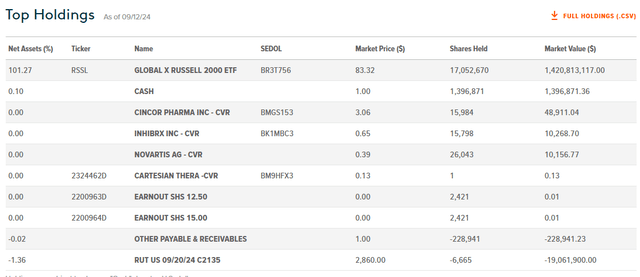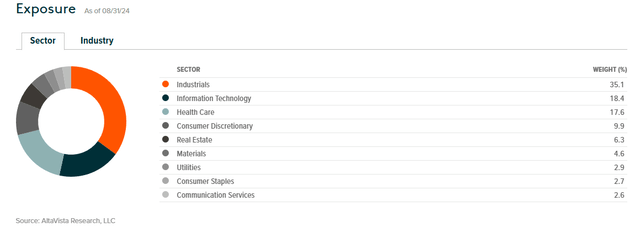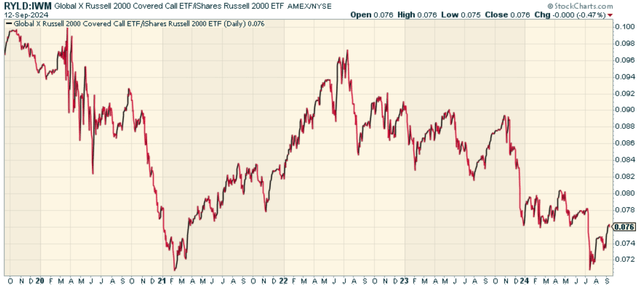RYLD: I'd Rather Prefer Small-Caps Without The Covered Call Overlay
Daniel Grizelj
Covered call strategies, which sell call options to juice yield, have been incredibly popular among retail investors over the last several years, and it seems like more and more of the funds I see that get popular have that overlay. Global X has gotten into that game with the Global X Russell 2000 Covered Call ETF (NYSEARCA:RYLD). And given how much I focus on small-caps on social media as a key tell on what comes next to broader equities (and where opportunities me rising), it think it's worth thinking through whether this is a better way to get exposure to small-caps for what comes next cycle-wise.
The idea is simple. RYLD seeks to give investors income through a covered call strategy on the Russell 2000 Index. This method can yield higher returns particularly in volatile market periods. RYLD's main goal is to deliver investment returns that match the price and yield performance of the Cboe Russell 2000 BuyWrite Index, before taking into account fees and expenses. The fund uses a "covered call" or "buy-write" approach, which involves buying their own Global X Russell 2000 ETF (RSSL) and at the same time writing (or selling) call options on that same index. The result of this is a distribution yield of 12.17% currently.
A Look At The Holdings
Remember that the fund's main holding is the Global X Russell 2000 ETF, which accounts for about 101.27% of the fund's net assets. This structure gives investors exposure to the entire Russell 2000 Index, with call options written against it.
globalxetfs.com
Since RYLD follows the Russell 2000 Index, its sector breakdown matches that of RSSL's. That is to say that Industrials make up the bulk of the allocation at 35%, followed by Tech at 18% and Health Care at 17%.
globalxetfs.com
Peer Comparison
Why do small-caps hold the key? Because they've gone no where since 2021 due to on-going concerns over higher for longer credit risk, whereby so-called "zombie companies" simply may not survive. This has limited the upside of small-caps as a headwind. Given this, you'd think that a covered call overlay would result in outperformance over just owning RSSL (or better yet the iShares Russell 2000 ETF IWM given its longer track record) outright.
Guess what? When you compare RYLD to IWM, we find that RYLD has meaningfully underperformed IWM. Yield or not, total return wise it looks like overall holding the Russell 2000 without an options overlay has performed better. Having said that, the ratio does appear to be turning higher, which could mean that going forward as market behavior changes, the selling of call options might actually be additive rather than just a detractor against relative total return potential.
seekingalpha.com
Pros and Cons
On the plus side, the fund gives a good yield. If you're big on yield, this gets you where you want to be, while granting exposure to small-caps which do have catch up potential against mega-cap stocks. Also, the covered call approach can help protect against market drops, as the money from selling options can make up for some losses when stock prices fall.
But we need to think about the downsides too. The covered call approach gives you income, sure, but it can hold back your gains when the market's on a roll. If stocks shoot up past the strike price of the calls you've written, you might miss out on some of those big wins. This means RYLD could fall behind a basic small-cap index fund when the market's doing well. Also, this strategy isn't as simple as it seems. A covered call setup has more moving pieces than a plain index fund. This can make it harder for some people to get a handle on how the fund will act in different market situations.
Conclusion
I don't mind the Global X Russell 2000 Covered Call ETF. Its high yield and potential to limit losses make it worth thinking about for investors who want income and don't mind the complexity of options strategies. But the fund isn't for everyone. It works best for people who want regular income now rather than big gains later, and who don't mind missing out on some profits during strong markets. It could fit well in a mix of investments that aim to generate income if you want to add some small-cap stocks. I just think you're better off longer term just going into the Russell 2000 without the overlay. Good fund for what it does, and another product that caters to the high yield retail demand out there.
Disclaimer: Investing carries risk. This is not financial advice. The above content should not be regarded as an offer, recommendation, or solicitation on acquiring or disposing of any financial products, any associated discussions, comments, or posts by author or other users should not be considered as such either. It is solely for general information purpose only, which does not consider your own investment objectives, financial situations or needs. TTM assumes no responsibility or warranty for the accuracy and completeness of the information, investors should do their own research and may seek professional advice before investing.
Most Discussed
- 1
- 2
- 3
- 4
- 5
- 6
- 7
- 8
- 9
- 10